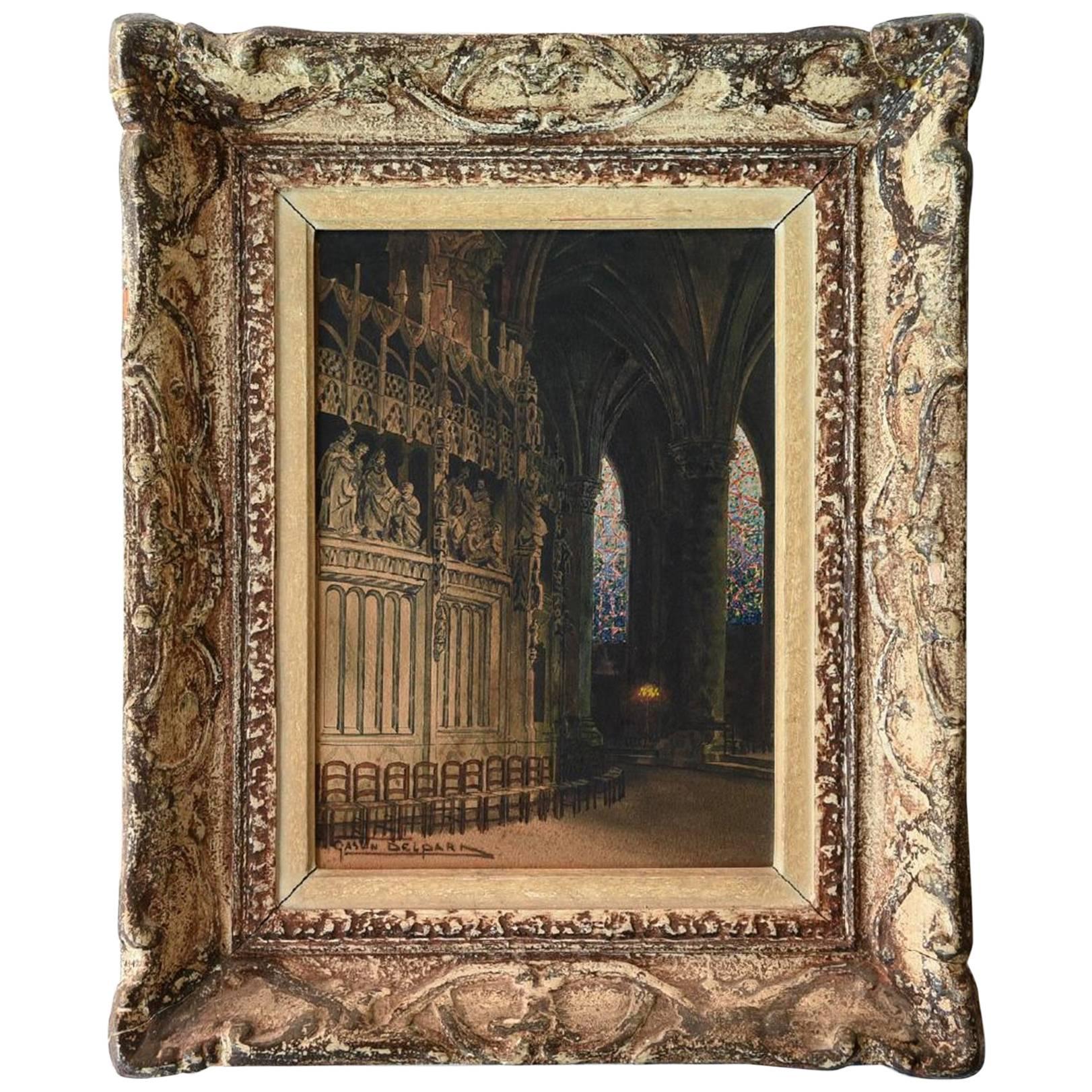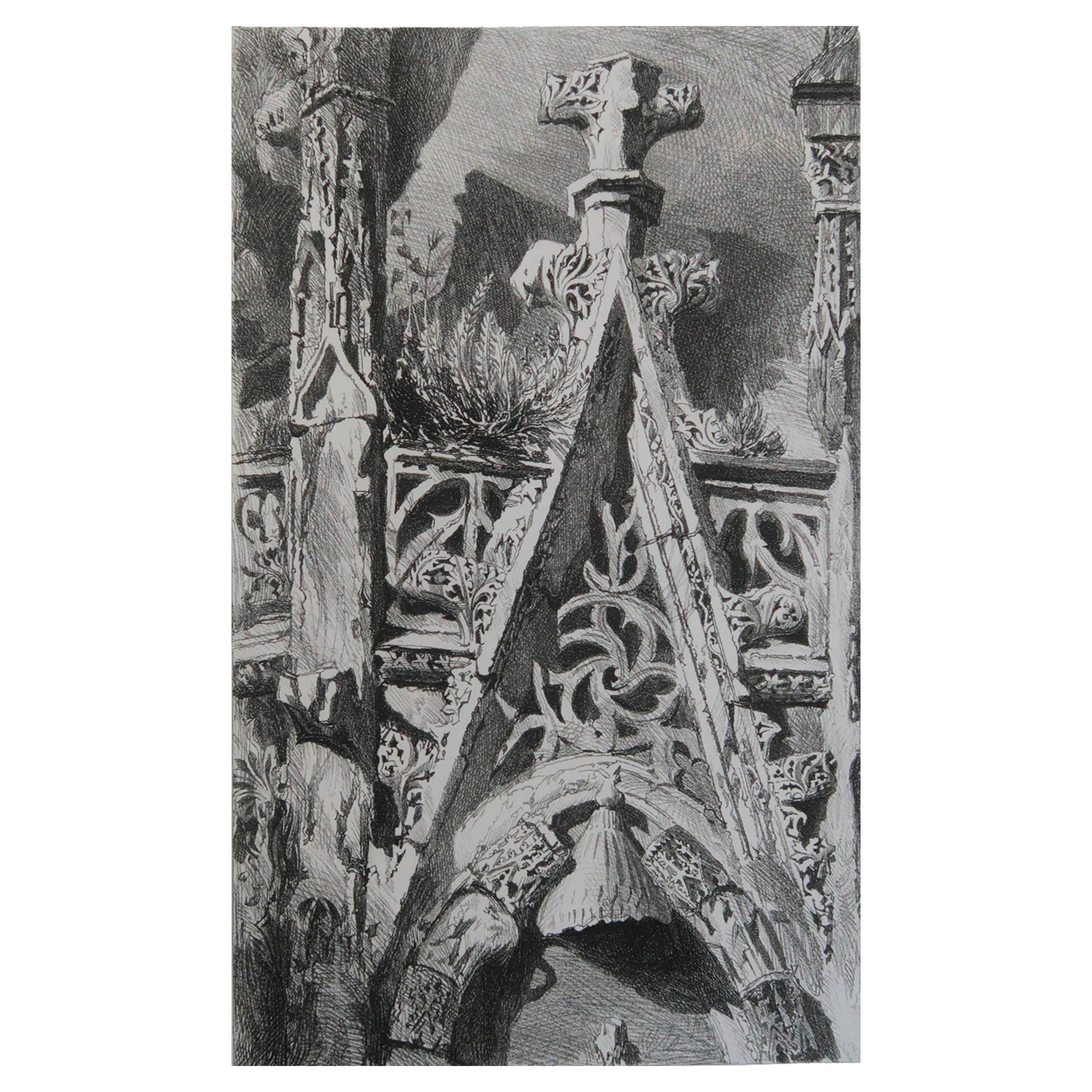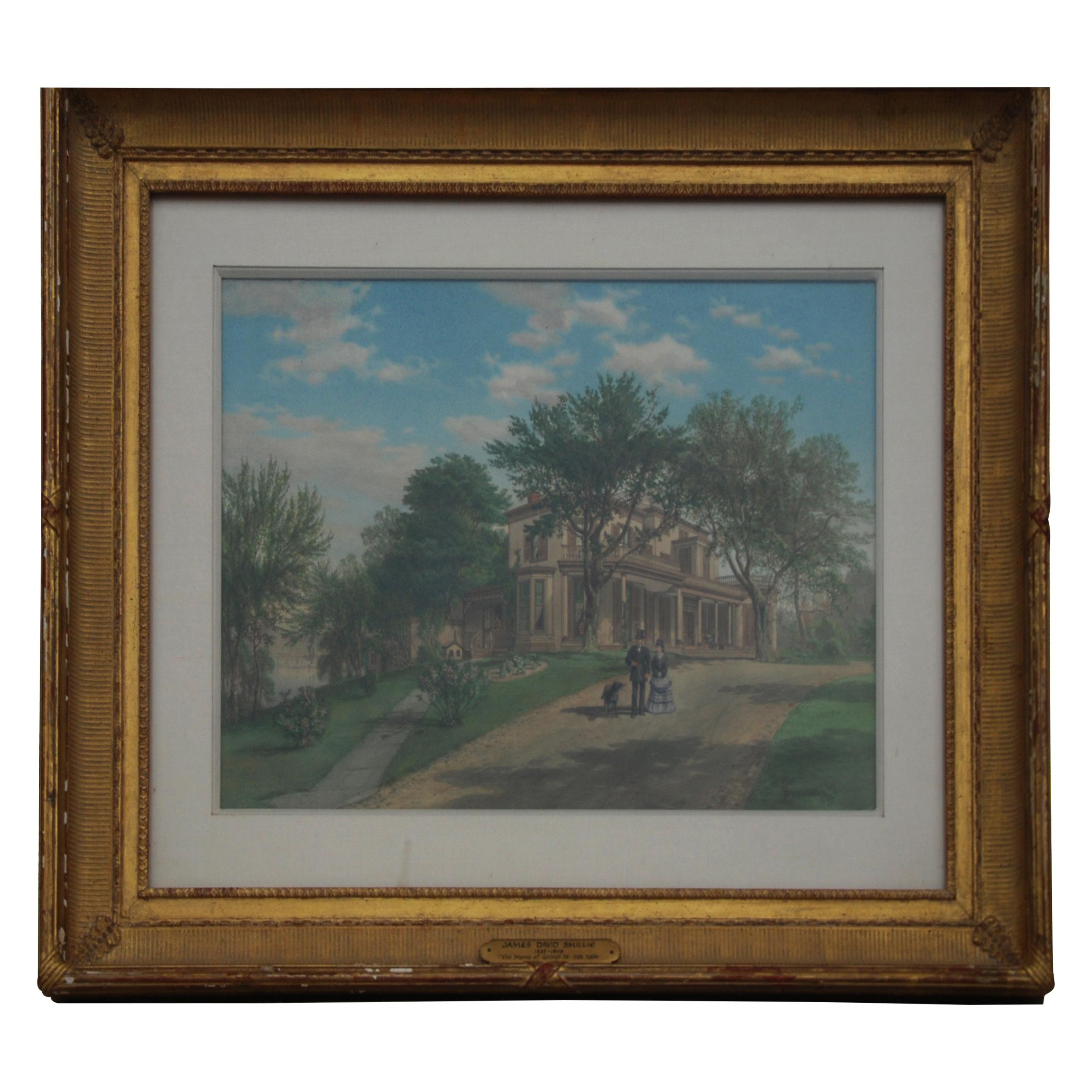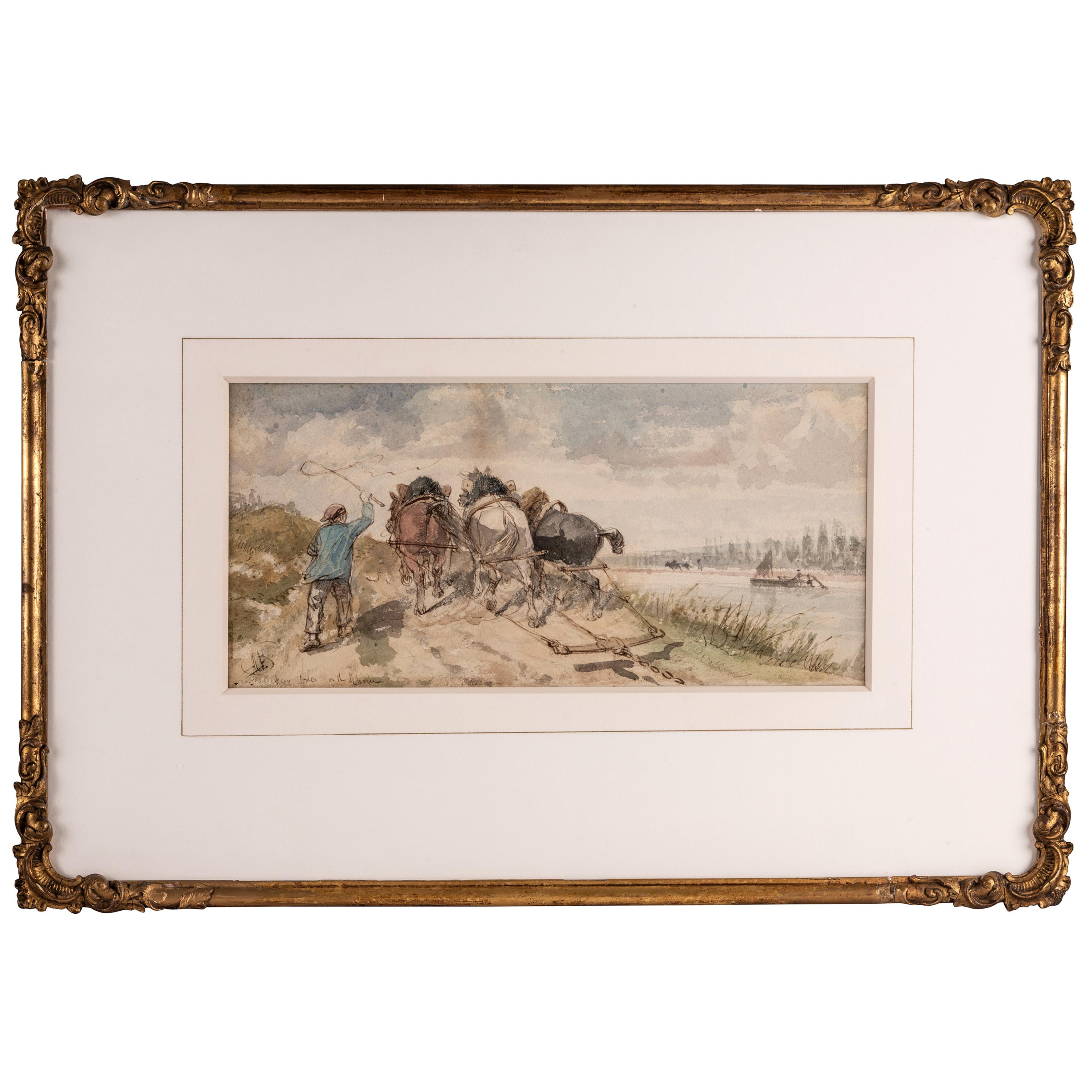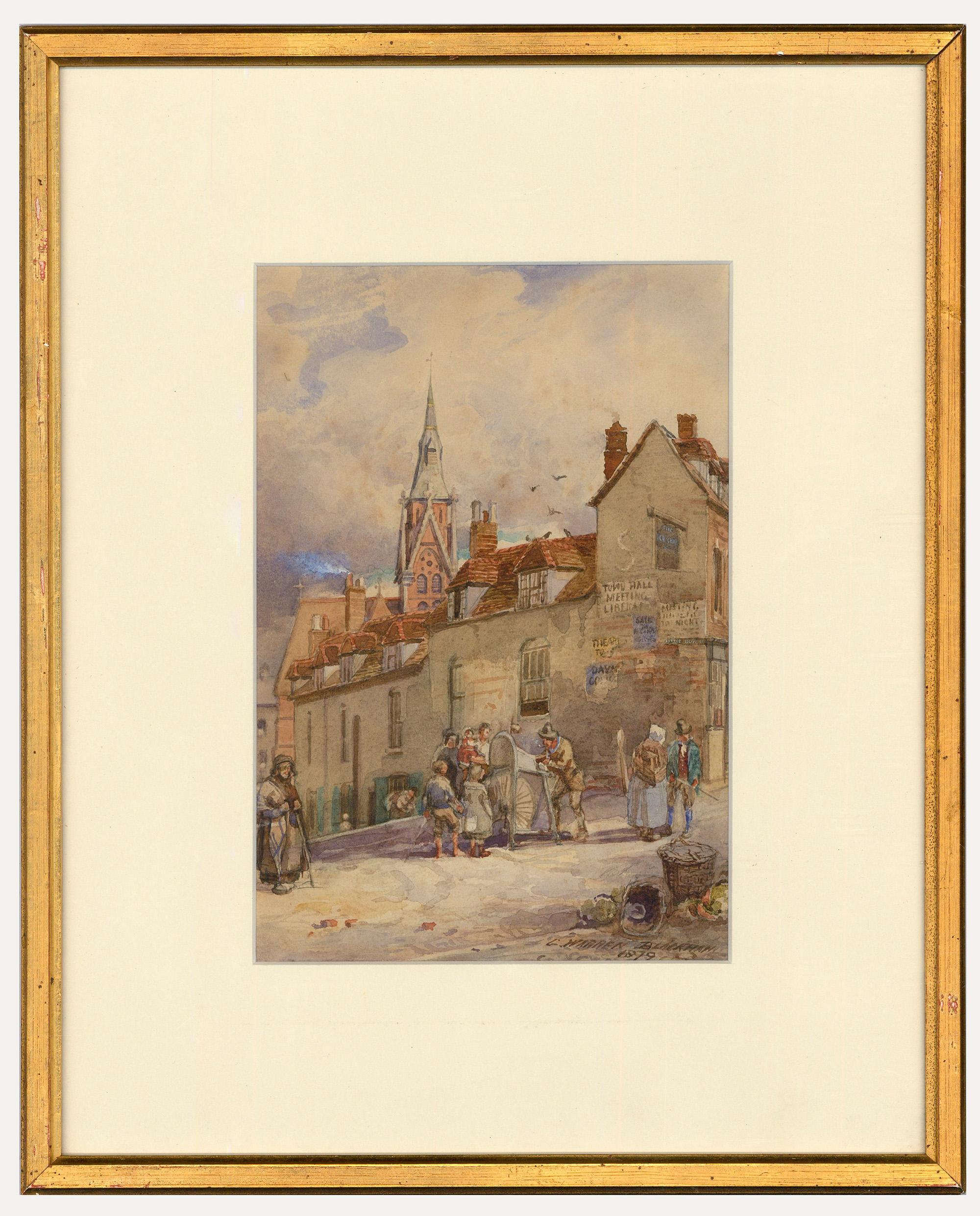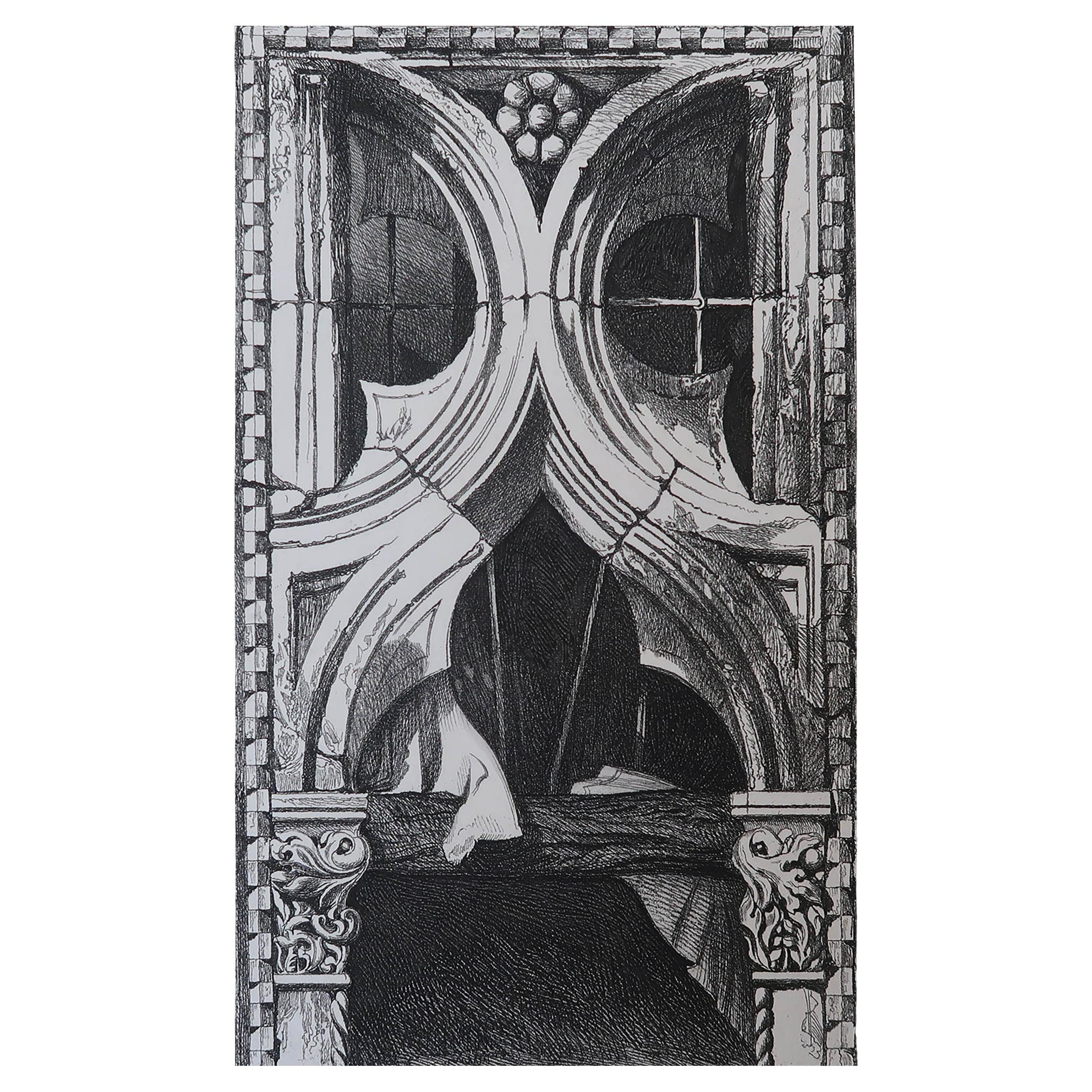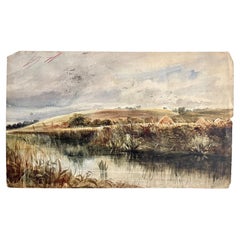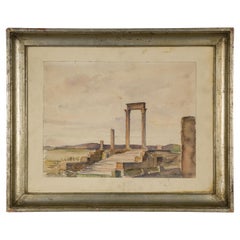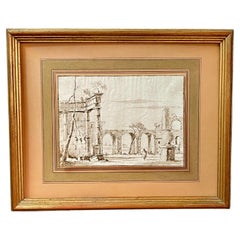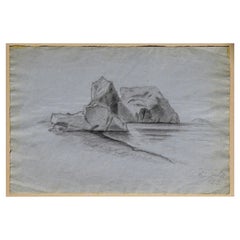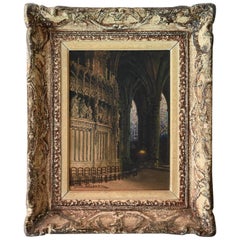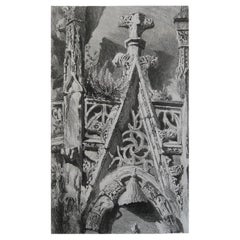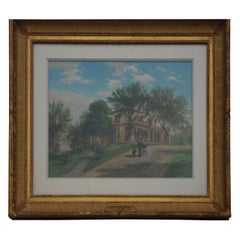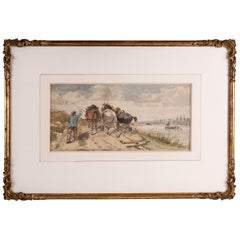Items Similar to John Ruskin 19th Century Watercolor Credited
Want more images or videos?
Request additional images or videos from the seller
1 of 7
John Ruskin 19th Century Watercolor Credited
$2,240.69
£1,677.21
€1,900
CA$3,083.82
A$3,437.24
CHF 1,803.40
MX$41,974.31
NOK 22,834.99
SEK 21,582.54
DKK 14,464.14
About the Item
This beautiful watercolor drawing of unmatched quality can be assigned entirely likely to the great artist and thinker John Ruskin.
Ruskin's developing interest in architecture, and particularly in the Gothic, led to the first work to bear his name, The Seven Lamps of Architecture (1849).
It contained 14 plates etched by the author.
The title refers to seven moral categories that Ruskin considered vital to and inseparable from all architecture: sacrifice, truth, power, beauty, life, memory and obedience.
Seven Lamps promoted the virtues of a secular and Protestant form of Gothic.
In this important work, the very high quality of the stroke is matched by the skillful search for an atmosphere of recollection that only Ruskin's watercolors can create.
This artwork, never before on the market, comes from an important French private collection
Every item of our Gallery, upon request, is accompanied by a certificate of authenticity issued by Sabrina Egidi official Expert in Italian furniture for the Chamber of Commerce of Rome and for the Rome Civil Courts.
Professional packaging assured
John Ruskin (8 February 1819 – 20 January 1900) was an English polymath – a writer, lecturer, art historian, art critic, draughtsman and philanthropist of the Victorian era.
He wrote on subjects as varied as art, architecture, political economy, education, museology, geology, botany, ornithology, literature, history, and myth.
In all of his writing, he emphasised the connections between nature, art and society.
Today, his ideas and concerns are widely recognised as having anticipated interest in environmentalism, sustainability, ethical consumerism, and craft.
Ruskin first came to widespread attention with the first volume of Modern Painters (1843), an extended essay in defence of the work of J. M. W. Turner in which he argued that the principal duty of the artist is "truth to nature".
This meant rooting art in experience and close observation.
From the 1850s, he championed the Pre-Raphaelites, who were influenced by his ideas.
His work increasingly focused on social and political issues.
Unto This Last (1860, 1862) marked the shift in emphasis.
In 1869, Ruskin became the first Slade Professor of Fine Art at the University of Oxford, where he established the Ruskin School of Drawing.
In the course of this complex and deeply personal work, he developed the principles underlying his ideal society.
Its practical outcome was the founding of the Guild of St George, an organisation that endures today.
In 1833 they visited Strasbourg, Schaffhausen, Milan, Genoa and Turin, places to which Ruskin frequently returned.
He developed a lifelong love of the Alps, and in 1835 visited Venice for the first time, that 'Paradise of cities' that provided the subject and symbolism of much of his later work.
These tours gave Ruskin the opportunity to observe and record his impressions of nature.
His early notebooks and sketchbooks are full of visually sophisticated and technically accomplished drawings of maps, landscapes and buildings, remarkable for a boy of his age.
Before Ruskin began Modern Painters, John James Ruskin had begun collecting watercolours, including works by Samuel Prout and Turner.
Ruskin toured the continent with his parents again during 1844, visiting Chamonix and Paris, studying the geology of the Alps and the paintings of Titian, Veronese and Perugino among others at the Louvre.
In 1845, at the age of 26, he undertook to travel without his parents for the first time.
It provided him with an opportunity to study medieval art and architecture in France, Switzerland and especially Italy. In Lucca he saw the Tomb of Ilaria del Carretto by Jacopo della Quercia, which Ruskin considered the exemplar of Christian sculpture.
He drew inspiration from what he saw at the Campo Santo in Pisa, and in Florence. In Venice, he was particularly impressed by the works of Fra Angelico and Giotto in St Mark's Cathedral, and Tintoretto
in the Scuola di San Rocco, but he was alarmed by the combined effects of decay and modernisation on the city: "Venice is lost to me", he wrote.
It finally convinced him that architectural restoration was destruction, and that the only true and faithful action was preservation and conservation.
Under existing legislation, any artwork created over 70 years ago by an artist who has died can requires a license for export regardless of the work’s market price. The shipping may require additional handling days to require the license according to the destination of the artwork.
- Attributed to:John Ruskin (Artist)
- Dimensions:Height: 8.47 in (21.5 cm)Width: 11.42 in (29 cm)Depth: 0.08 in (2 mm)
- Style:Romantic (Of the Period)
- Materials and Techniques:
- Place of Origin:
- Period:
- Date of Manufacture:1880 ca.
- Condition:Wear consistent with age and use. Minor losses. Minor structural damages. Minor fading.
- Seller Location:Roma, IT
- Reference Number:1stDibs: LU4827245401492
About the Seller
5.0
Platinum Seller
Premium sellers with a 4.7+ rating and 24-hour response times
Established in 2005
1stDibs seller since 2019
91 sales on 1stDibs
Typical response time: 2 hours
- ShippingRetrieving quote...Shipping from: Rome, Italy
- Return Policy
Authenticity Guarantee
In the unlikely event there’s an issue with an item’s authenticity, contact us within 1 year for a full refund. DetailsMoney-Back Guarantee
If your item is not as described, is damaged in transit, or does not arrive, contact us within 7 days for a full refund. Details24-Hour Cancellation
You have a 24-hour grace period in which to reconsider your purchase, with no questions asked.Vetted Professional Sellers
Our world-class sellers must adhere to strict standards for service and quality, maintaining the integrity of our listings.Price-Match Guarantee
If you find that a seller listed the same item for a lower price elsewhere, we’ll match it.Trusted Global Delivery
Our best-in-class carrier network provides specialized shipping options worldwide, including custom delivery.More From This Seller
View AllDavid Bates Watercolour Landscape 19th Century Double-Face
By David Bates b.1840
Located in Roma, IT
Beautiful and intense watercolour representing, on both faces, a landscape shot with rare expressive force.
This artwork, never before on the market, comes from an important Europea...
Category
Antique Late 19th Century English Edwardian Drawings
Materials
Paper
Period Italian Signed Grand Tour Watercolor
Located in Roma, IT
Period Italian Signed Grand Tour Watercolor
Beautiful watercolour depicting the ancient Roman colony Timgad
Signed, dated and located in the l...
Category
Early 20th Century Italian Grand Tour Paintings
Materials
Glass, Wood, Paper
Period Venetian School Ink Picture Capriccio
By Francesco Guardi
Located in Roma, IT
Important ink drawing representing animated landscape with ruins and aqueduct in the background
Venetian school
Every item of our Gallery, upon request, is accompanied by a certific...
Category
Antique Mid-18th Century Italian Rococo Drawings
Materials
Glass, Wood
Francesco Paolo Michetti Period Italian Landscape Signed Drawing
By Francesco Paolo Michetti
Located in Roma, IT
Beautiful and evocative work assigned to Francesco Paolo Michetti, one of the greatest Italian artists at the turn of the 19th and 20th centuries.
Signed lower right
The work can be...
Category
Antique Late 19th Century Italian Romantic Drawings
Materials
Paper
20th Century Signed Still Life Pencil Drawing
Located in Roma, IT
Beautiful, evocative Pencil Drawing
Still Life with Flowers and Butterfly
Early 20th century
Signed at lower right
The painting is embellished by a beautiful nineteenth-century la...
Category
Vintage 1920s Italian Art Nouveau Paintings
Materials
Wood, Paper
Pair of a Period Italian Grand Tour Litographies
Located in Roma, IT
Beautiful and important pair of architectural studies of the Roman Forum as they appeared in the time of the Empire precisely, as the inscriptions in the works attest, in 315 B.C.
In...
Category
Early 20th Century Italian Grand Tour Prints
Materials
Glass, Wood, Paper
$1,002 / item
You May Also Like
19th Century Watercolor of a Cathedral
Located in Sheffield, MA
Watercolor on paper mounted on masonite board with ornate gilt frame.
Dimensions: (Board) H 13.5" x W 10"
Category
Antique 19th Century Paintings
Materials
Paper
Original Antique Architectural Print by John Ruskin, circa 1880 'St. Lo'
By John Ruskin
Located in St Annes, Lancashire
Wonderful gothic architectural print.
Cathedral of St. Lo
Steel engraving by R.P. Cuff after the original drawing by John Ruskin
Published circa 1850
On wove quality pape...
Category
Antique 1880s English Gothic Revival Prints
Materials
Paper
1872 Watercolor by James David Smillie
Located in Pasadena, TX
James David Smillie (January 16, 1833 – September 14, 1909), American artist, was born in New York City.
His father, James Smillie (1807–1885), a Scot...
Category
Antique 1870s North American Romantic Paintings
Materials
Paint
Watercolor by Richard Beavis, 19th Century British School
Located in Kittery Point, ME
Richard Beavis (British, 1824-1896)
Near Arles on the Rhone
Initialed and titled lower left.
Ink and watercolor on paper/board.
With an old attribution to Bonnington.
Sight size: 6 x 13 in. The dimension given otherwise includes the frame.
Framed in a charming late 19th century frame.
Best known for his rural landscapes, the British painter Richard Beavis populated his scenes with picturesque grazing cattle and people hard at work as well illustrated in our watercolor.
Provenance: The estate of Sir Edwin A.G. Manton (1909-2005) a driving force in the creation of the American International Group (AIG), a collector of paintings by John Constable...
Category
Antique Late 19th Century English Victorian Drawings
Materials
Paper
$1,120 Sale Price
20% Off
George W. Blackham (1832-1912) - Late 19th Century Watercolour, Little Bow St.
Located in Corsham, GB
A charming late 19th century watercolour painting of Little Bow street near Horsefair, Birmingham. Signed and dated to the lower right. Presented in a narrow gilt frame with a new ca...
Category
Late 19th Century Landscape Drawings and Watercolors
Materials
Watercolor
$343 Sale Price
20% Off
Original Antique Architectural Print by John Ruskin, circa 1880, Venice
By John Ruskin
Located in St Annes, Lancashire
Wonderful Gothic architectural print.
Window from Ca Foscari, Venice
Steel engraving by R.P. Cuff after the original drawing by John Ruskin
Published, circa 1880
On wove ...
Category
Antique 1880s English Gothic Revival Prints
Materials
Paper
More Ways To Browse
Medieval Plate
License Plate
French Santos
Cathedral Plates
Oxford Plates
Christian Wall Sculpture
Strasbourg Cathedral
Chamonix Antique
Chinese Chest Red
Chinese Ming Chairs
Chinese Soldier
Chinese Tassel
Curtis Jere Metal Art
Eames Book
Ebony Wood Carving
English Watering Can
Fancy Dining Table
Francois Jewelry Vintage
